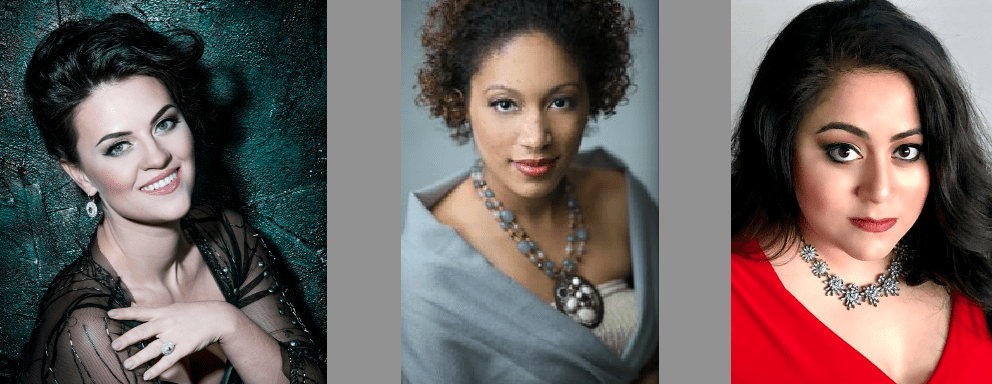3 Sopranos, 3 Paths to Violetta of ‘La Traviata’
By • October 15, 2018 0 4033

Italian composer Giuseppe Verdi’s 1853 classic opera “La Traviata” goes way back in time. It’s one of the great operas in the repertoire, showing up repeatedly on the lists of seasons for national and international opera companies and venues every year.
Based on “La Dame aux Camelias,” the novel by Alexandra Dumas, it translates out to “Lady of the Camelias,” the flower happening to be a favorite of the central character and the center of Verdi’s opera, Violetta Valery, a mid-19th century courtesan, free-wheeling, hypnotic to men, and doomed.
As a character, Violetta has entranced audiences for more than a century. As a role in a perpetually popular opera, Violetta has a particular effect on sopranos, because of its challenges and demands — and because of its enduring qualities, its difficulties and the way. When done with power, emotion and range, it reverberates through our collective culture.
“La Traviata” is ending its season-opening run at the Washington National Opera this week, which gives three sopranos another shot to impress audiences with their versions of the life, time and passing of Violetta.
Star Russian soprano Venera Gimadieva, who opened the run and has performed Violetta many times, will perform Oct. 17 and in a matinee on Oct. 21. The Detroit native soprano Jacqueline Echols performs Saturday night, Oct. 20, and Houston native Marlen Nahhas will take her turn in starring in the Domingo-Cafritz Young Artist Production Friday, Oct. 19.
All three talented women find different challenges, different pleasures and different experiences in the role, generally considered one of the most difficult in opera for sopranos. The three answered questions by e-mail on their views of the role and the opera.
For Gimadieva, her first encounter with Violetta was through a DVD version from Salzburg, when she was a student. “I was impressed with what was a modern production, and I was also amazed by the singers. For the first time, it occurred to me that in opera you cannot only sing but also act.”
She found the character instantly compelling. “Violetta is an ultimate female character placed in a specific situation,” she said. “Paradoxically, she has everything a woman needs—beauty, wealth, fame, love, but there is no total happiness, she is terminally ill. …The journey she travels from a glamorous salon ruler to a woman desperately in love is fascinating. What I like most is that she totally lacks selfishness. She is capable of self-sacrifice.”
Echols doesn’t remember the first time she encountered the opera, she told us, “but I do remember a memorable performance by a then young soprano by the name of Ailyn Perez. She was a stunning Violetta. The story has layers of emotions to get through like ecstatic, surprised, confused, lonely, sad, anger,rejected, depressed excited and so on. You had to be in touch on every level to be effective dramatically. She’s a difficult character to pull off. I’m still working mastering every emotion.”
“I don’t think there is a best Violetta, but an effective one,” Echols continued. “One who can use their voice in three different ways and dramatically pull it off—coloratura, lyric and dramatic. Maria Callas was effective in this.”
“The most difficult part of the role is being able to sing all three ways and nail it every time,” Echols added. “With that said, the dramatic portion is just as important. I’ve learned how to become vulnerable. Putting your soul on the stage can be difficult for someone who is quite reserved. But it stretched me to be the actress I am today. I am grateful for this role.”
Nahhas first encountered “Traviata,” when watching the movie “Pretty Woman,” in which Julia Roberts’s character was taken to see the opera by Richard Gere. The scene “was probably the first moment I knew I had discovered something special.”
“The most difficult part of playing Violetta vocally would be figuring out how to pace the role,” Nahhas. “It is easy to over sing in act one and get carried away with excitement of the music and the drama. However, this always ends up costing you in act three, if you’re not careful. Acting-wise, it’s incredibly difficult to play a sick person, when you haven’t experienced that level of illness.”
Gimadieva thinks opera is important both here and in Europe, even if the audiences are different.
In terms of Violetta, Nahhas said, “I know she is a good person at her core. She can forgive. I can’t think of a better role to make my Kennedy Center debut with! However, this opera could be performed in a shoe and still be impactful and beautiful.”
Gimadieva thinks highly of Anna Moffo’s performance in the role. As far as sopranos and temperament go, “every singer has a different temperament, and different roles require different tempers, too. There is Tatiana and there is Manon, there is Violetta and there is Lucia. All these women are individuals and all of them are sopranos. We cannot generalize.”
Echols thinks Violetta is particular to her time and not necessarily for today. “I don’t see her as a person who would be of the age of #metoo. She was high level courtesan. I believe she had complete control of what she wanted and with whom she wanted.”
Echols sees the legendary Leontyne Price as her main inspiration. “Her life speaks for itself.”
“So far, my favorite role is what I am working now. Violetta will always be my favorite role.”

